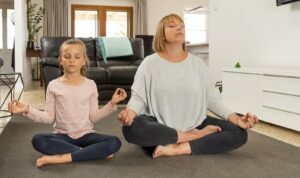May is national Mental Health Awareness Month. And perhaps at no other time lately has awareness of your own mental health and those of your kids and other family members been more important. It’s been a long, often very hard year and a few months for all of us. So join us this month as we explore ways to boost mental health for the whole family!
Do you remember the last time that you had a good, long, hard laugh? Like tears coming to your eyes, hard-to-breath laughing? It turns out that laughter is very good for you! It can improve your mental health by giving you positive feelings and also feelings of self-confidence and self-worth. Laughter can also boost your immune system. And, laughing and reacting to something that you find funny increases your heart and respiratory rates like exercise does.
One really good way to get yourself and others laughing that can involve your whole family is to be silly! Being silly is fun and makes us laugh. It can give us permission to do things that we don’t usually get to do, like dancing in the kitchen or wearing clown make-up. And because of that it can be a great way to release stress and tension.
I can hear some of you saying “But I am an adult. I don’t know/remember how to be silly.” Or “I am not comfortable being silly.” Well, here is where kids can be the experts and help you out. Kids LOVE being silly. Have you ever noticed how your child can go into gales of laughter because they see something that they think is “silly”, often something that their parents do? Or how they can send themselves into fits of giggles just by making faces at themselves in the mirror? Think about the silly things that your kids do that make them and you laugh. Then join in!
Or try out some of these ideas for “getting the sillies”:
Have a family dance party. Put on some of your family’s favorite music and dance like no one is watching. Or better yet, see who can make everyone who is watching laugh the hardest with their groovy, silly dance moves. Dance like an elephant, a chicken, or a platypus!
Dress up! Find the funniest combinations of outfits you can. Check out the family hat collection. Or maybe match a tiara with basketball shorts.
Try out wacky hairstyles. Put your hair in spikes, ponytails, braids. Get some temporary hair dye and see who can come up with the most amazing color combinations. See how many hair clips you can fit in your hair at one time.
Talk like a pirate! Challenge the family to an hour or a day of only talking like a pirate. Or like a movie star. Or a DJ. Let everyone have a turn picking a character.
One note about kids and being silly. Sometimes younger kids may get super excited and not be able to calm down. This is normal since young kids are still learning about how to regulate their feelings and behaviors. But it can lead to parents feeling frustrated which can leave everyone feeling unhappy at the end of what was supposed to be a positive experience. If you know (or suspect) that your kids might get over-excited during a family silly activity, try pre-teaching them that when they start to get over-excited, you will all take a “calm break”. During this time, you can take deep breaths with your child. Or ask everyone to move in slow motion. This will still be super fun, but it’s hard to be over excited when you are moving sl-o-o-o-wly. If your kids say that they want to continue the activity, let them know that they can go back to it when you all take some time to feel calm again.
When you can let loose and be silly, you can boost your own mental and physical health, help your kids’ health, and get to spend some positive time with them. So, go ahead. Be silly! We won’t tell anyone.
[divider type=”standard” text=”Go to top” full_width=”no” width=”1/1″ el_position=”first last”]
Text: © Kids In Transition to School 2021
Image: © Igor Mojzes | Dreamstime.com





